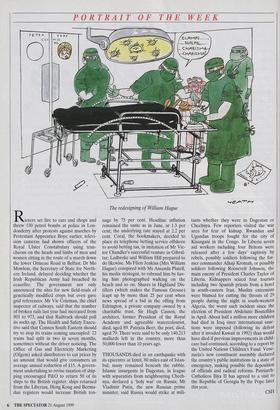PORTRAIT OF THE WEEK
The redesigning of William Hague Rioters set fire to cars and shops and threw 130 petrol bombs at police in Lon- donderry after protests against marches by Protestant Apprentice Boys; earlier, televi- sion cameras had shown officers of the Royal Ulster Constabulary using trun- cheons on the heads and limbs of men and women sitting in the route of a march down the lower Ormeau Road in Belfast. Dr Mo Mowlem, the Secretary of State for North- ern Ireland, delayed deciding whether the Irish Republican Army had breached its ceasefire. The government not only announced the sites for new field-trials of genetically modified crops but even gave grid references. Mr Vic Coleman, the chief inspector of railways, said that the number of broken rails last year had increased from 801 to 973, and that Railtrack should pull its socks up. The Health and Safety Execu- tive said that Connex South Eastern should try to stop its trains coming uncoupled: 22 trains had split in two in seven months, sometimes without the driver noticing. The Office of Gas and Electricity Marketing (Ofgem) asked distributors to cut prices by an amount that would give consumers an average annual reduction of £15. A govern- ment undertaking to revise taxation of ship- ping encouraged P&O to return 50 of its ships to the British register; ships returned from the Liberian, Hong Kong and Bermu- dan registers would increase British ton- nage by 75 per cent. Headline inflation remained the same as in June, at 1.3 per cent; the underlying rate stayed at 2.2 per cent. Coral, the bookmakers, decided to place its telephone betting service offshore to avoid betting tax, in imitation of Mr Vic- tor Chandler's successful venture in Gibral- tar; Ladbroke and William Hill prepared to do likewise. Ms Ffion Jenkins (Mrs William Hague) conspired with Ms Amanda Platell, his media strategist, to rebrand him by hav- ing him photographed walking on the beach and so on. Shares in Highland Dis- tillers (which makes the Famous Grouse) leapt up by more than 25 per cent when news spread of a bid in the offing from Edrington, a private company owned by a charitable trust. Sir Hugh Casson, the architect, former President of the Royal Academy and agreeable watercolourist, died, aged 89. Patricia Beer, the poet, died, aged 79. There were said to be only 140,213 mallards left in the country, more than 50,000 fewer than 10 years ago.
THOUSANDS died in an earthquake with its epicentre at Izmit, 80 miles east of Istan- bul; many remained beneath the rubble. Islamic insurgents in Dagestan, in league with separatists from neighbouring Chech- nya, declared a 'holy war' on Russia; Mr Vladimir Putin, the new Russian prime minister, said Russia would strike at mili- tants whether they were in Dagestan or Chechnya. Few reporters visited the war area for fear of kidnap. Rwandan and Ugandan troops fought for the city of Kisangani in the Congo. In Liberia seven aid workers including four Britons were released after a few days' captivity by rebels, possibly soldiers following the for- mer commander Alhaji Kromah, or possibly soldiers following Roosevelt Johnson, the main enemy of President Charles Taylor of Liberia. Kidnappers seized four tourists including two Spanish priests from a hotel in south-eastern Iran. Muslim extremists were blamed for cutting the throats of 29 people during the night in south-western Algeria, the worst such incident since the election of President Abdelaziz Bouteflika in April. About half a million more children had died in Iraq since international sanc- tions were imposed (following its defeat after it invaded Kuwait in 1992) than would have died if previous improvements in child- care had continued, according to a report by the United Nations Children's Fund. Vene- zuela's new constituent assembly declared the country's public institutions in a state of emergency, making possible the deposition of officials and radical reforms. Patriarch- Catholicos Iliya II has agreed to a visit to the Republic of Georgia by the Pope later this year.
csH


























































 Previous page
Previous page